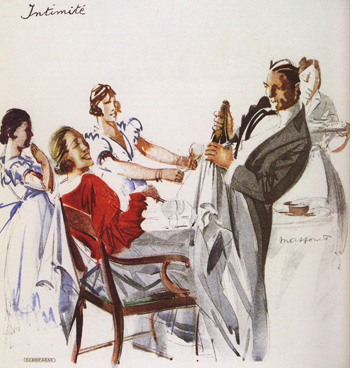 ——– Le dimanche 11 mai 2008 à 19:27 Daniel Berger a écrit :
——– Le dimanche 11 mai 2008 à 19:27 Daniel Berger a écrit :
Cher Lincoln,
je viens de trouver trace d’un livre de la plus extrême rareté, absent des bibliographies consacrées au vin, l’Institution de l’Ordre des Chevaliers de la Joye, sous la protection de Bacchus et de l’Amour, établie le 18 janvier 1696.
C’est la charte d’une aimable société de Mézières (sans doute près d’Orléans, à vérifier) qui n’avait qu’un but : boire et faire l’amour le plus gaîment possible. Les associés se réunissaient le jeudi et le dimanche, chacun régalant à tour de rôle « avec abondance de vin et de liqueurs, de violons et de bonne chère« . L’Ordre comptait des dames. Chaque chevalier devait être gentilhomme et savoir boire, et choisissait sa dame à chaque réunion. Durant les repas on devait entendre « un carillon de verres, interrompu seulement par des chansons bachiques« .
Don’t you feel joisse about that?
db
——– Le vendredi 5 septembre 2003 à 15:43 Daniel Berger a écrit :
Dear Lincoln,
your charming Anne says that « joisse » is plouc. Maybe I feel more on the peasant side these days. If Anne used « plouc » instead of « peasant », I believe she is partly wrong : « joisse » has indeed a popular meaning to do with joy and happiness deriving from « joyce » apparently, or is it the opposite? meaning TRÈS « content », « réjoui », « satisfait », « heureux ». It has an additional sexual nuance though – the reason why I suggested you to ask her to tell you more about the meaning of joisse. Please do not see any offense both of you, you have a capacity to make her feel joisse and she has that same capacity…
And wine provides that physical and spiritual rejoycing. Wine can make you feel joisse.
But of course I leave Anne teach you more about rive gauche semantics subtleties.
Happy to see you joisse and sorry about Anne’s absence in le Layon.
Amicalement à vous deux
db
——– Le vendredi 5 septembre 2003 à 11:39, Lincoln a écrit :
Dear Daniel,
Anne thinks that « joisse » has something to do with happiness. In which case I am joisse to organise le Layon and to help your daughter Camille with her report…
Mind you, Anne is wondering why you are teaching me « peasant » expressions (she used a similar word, but one I would not repeat) when you should be initiating me in terminology more appropriate to the rive gauche!
She is tough!
Linc
